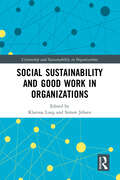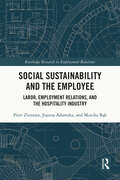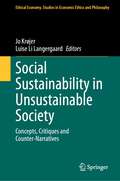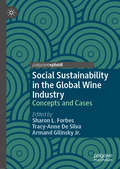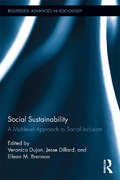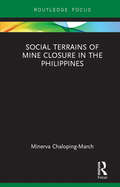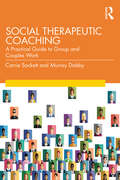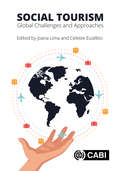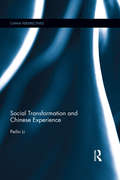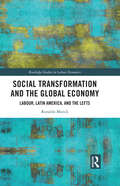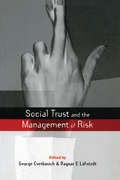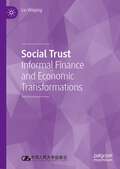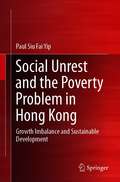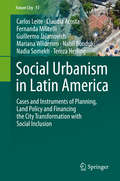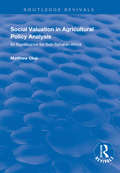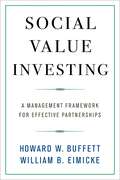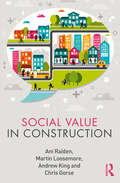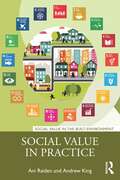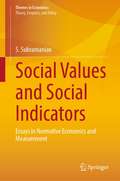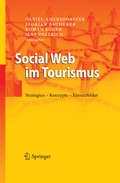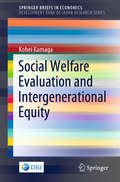- Table View
- List View
Social Sustainability and Good Work in Organizations (Citizenship and Sustainability in Organizations)
by Klarissa Lueg Simon JebsenThis edited research monograph collects nine unique research contributions on the concept of social sustainability and its connection to possibilities and hindrances for good work in organisations. Social sustainability, in organisational contexts, emphasizes the long-term well-being of stakeholders and communities. The authors in this book demonstrate how organisational long-term strategies should prioritise employee well-being, mental health, community engagement, and ethical supply chain management, inter alia. Readers, from undergraduate students to the research community, will learn how long-term social sustainability orientation is different from Corporate Social Responsibility, which responds to immediate stakeholder expectations. The United Nations' Sustainable Development Goals have nudged many organisations to implement social sustainability, and many authors in this book relate to UN concepts such as the SDGs or Global Compact’s definition of social sustainability. However, many organisations have come under scrutiny for acting merely ceremonial to live up to the current megatrends. In consequence, readers will take away that the line between genuine corporate mission and ceremonial lip services must be critically observed, and how this can be done in different areas. Key chapters of this book explore social sustainability, e.g., in higher education (as sustainable knowledge in business students), in corporate communication (employee identification, corporate volunteering, and corporate heritage), and in sustainable human resource management practices. Workplace toxicity, especially towards minorities, is explored, highlighting both the role of bystanders, and the financial repercussions of ignoring workplace harassment. Digital transformation's social implications, employee well-being, and the importance of psychological safety in startups are addressed. The chapters, all together, signify the relevance of meaningful work for long-term societal cohesion and individual fulfilment.
Social Sustainability and the Employee: Labor, Employment Relations, and the Hospitality Industry (Routledge Research in Employment Relations)
by Piotr Zientara Joanna Adamska Monika BąkThis research monograph delves into the pressing issue of employee-centered social sustainability in the hospitality industry. Through empirical studies and content analysis of CSR reports, it highlights the significant challenges faced by frontline hospitality workers – such as low wages, job insecurity, limited union representation, and employer resistance to unionization.Offering a thorough, evidence-based examination, the monograph provides a comprehensive analysis of the employee dimension of social sustainability. It explores the critical role of organizational support, the fear of unionizing, and their impact on key outcomes like employee well-being and industry turnover intentions. The work also proposes a tailored framework for addressing employee needs at different stages of their careers, advancing the goal of "decent work" within the industry.Ideal for scholars and researchers in workforce studies, hospitality, and tourism, this volume offers valuable insights into the complex dynamics of labor practices and social sustainability. It serves as a vital resource for those seeking to foster employee-centered CSR initiatives. Policymakers, industry professionals, and advocates for improved labor conditions in hospitality will also find this book informative and thought-provoking, with actionable strategies for promoting social responsibility across the sector.
Social Sustainability for Business
by Jerry A. Carbo Viet T. Dao Steven J. Haase M. Blake Hargrove Ian M. LangellaSocial Sustainability for Business demonstrates the need for a transformational change to the way businesses across the globe operate. What has become the standard, accepted "business model," with a focus on corporate profit, shareholder wealth maximization, and GDP growth, is no longer a sustainable business model for workers, consumers, communities, society, the planet, or any of its inhabitants and ecosystems. The authors argue that the current commercial system depletes natural resources, denigrates human rights, and inhibits positive social and technological innovation. To address these issues, they focus on societal goals—such as a sustainable planet, meeting human rights of workers, and safe products for consumers—and outline steps that organizations and individuals must take to achieve them. Readers will gain insight into the psychological barriers to and influences on sustainable behavior. They will also learn how reconsidering corporate social responsibility and business ethics can stop and reverse the destruction of a profit-based approach. Cases on modern examples of sustainability or lack thereof explain how establishing and maintaining a socially sustainable business system can protect the environment, meet the rights of its people, and ensure that their needs are met tomorrow. End-of-chapter and end-of-case discussion questions will help students in sustainability classes to think critically about the practical impact of the topics discussed.
Social Sustainability in Unsustainable Society: Concepts, Critiques and Counter-Narratives (Ethical Economy #67)
by Luise Li Langergaard Jo KrøjerThis book offers a unique, critical exploration of concepts and practices of social sustainability through both a critical concept analysis as well as empirical studies of practices that undermine social sustainability. It addresses the questions: What is the main role of social relations and social practice in the transition from fundamentally unsustainable societies and local practices towards a sustainable future? And how does economical sustainability reduce or enhance social sustainability? The chapters in this work define and understand social sustainability in relation to principles such as solidarity, community, welfare, reciprocity, and regenerative co-existence. These principles are analyzed through the lens of emotions, respect, carefulness, sensitivity, and art, to establish counter-principles and narratives to principles like growth, efficiency, capitalism, and mastery of nature. Such counter-narratives to mainstream understandings and histories of economy aid in shedding light on a variety of different aspects of sustainability. The book presents a methodological plurality including conceptual and empirical approaches, praxis-oriented and inductive approaches. The chapters present interdisciplinary approaches concerning welfare, ecology, sociology, organization and economy, social psychology and aesthetics and therefore appeal to a broad audience of scholars and academics.
Social Sustainability in the Global Wine Industry: Concepts and Cases
by Armand Gilinsky Jr. Sharon L. Forbes Tracy-Anne De SilvaThis book examines the social dimension of sustainability in the wine industry. Social sustainability focuses on people and communities. Contributors explore topics such as philanthropy, poverty, natural disasters, communication, and wine tourism from a global perspective using research and case studies in developed and developing countries. This edited book provides researchers, academics, practitioners and students with varied perspectives of social sustainability in the global wine industry.
Social Sustainability: A Multilevel Approach to Social Inclusion (Routledge Advances in Sociology #101)
by Veronica Dujon Jesse Dillard Eileen M. BrennanHow can we raise the standard of living of the world’s poor and maintain high levels of social health and well-being in the developed world, while simultaneously reducing the environmental damage wrought by human activity? The social dimension of sustainability is becoming recognized as a necessary if not sufficient condition for attaining economic and environmental sustainability. The requisite dialogue requires inclusion at multi-levels. This collection of works is an ambitious and multi-disciplinary effort to indemnify and articulate the design, implementation and implications of inclusion. Included are theoretical and empirical pieces that examine the related issues at the local, national and international levels. Contributors are grounded in Sociology, Economics, Business Administration, Public Administration, Public Health, Psychology, Anthropology, Social Work, Education, and Natural Resource Management.
Social Terrains of Mine Closure in the Philippines (Routledge Studies of the Extractive Industries and Sustainable Development)
by Minerva Chaloping MarchThe current discourse on mine closure is informed predominantly by industry and corporate perspectives and predicated by experiences of mainly mining companies that are based in developed countries where necessary planning frameworks and regulatory requirements are well-established. Mine closure planning, well promoted and accepted as good business practice in the global minerals industry, has been primarily technical and precautionary both in approach and focus. Planning, modelling and monitoring strategies incorporate comprehensive and detailed elements such as properties inherent in landforms, climate, geology, flora and fauna, among others. However, locality-based concerns that revolve around resource access and tenure, rights and entitlements tied to locality and indigeneity, labour recruitment, and other non-bio-physical elements are hardly examined. Any mine closure program that omits these elements is deficient and therefore ineffective. Social Terrains of Mine Closure in the Philippines, based on ethnographic research and archival materials, presents the varying experiences of three mines to demonstrate that the mine closure process is an intense locus for competition and compromises among various social actors. This book offers key messages for understanding the complex socio-cultural, economic, political, and business realities that make up the social terrains of mine closure, and will be of great interest to students and researchers in development studies, community development, business studies, anthropology, and sociology. It will also appeal to those working in the global minerals sectors and NGOs that engage in development work and advocacy for responsible mining.
Social Theory (Routledge Revivals)
by G.D.H. ColeFirst published in 1920, Social Theory endeavours to put together the social contents of various experiences of the ordinary man, and to make them, as far as they form one, a coherent and consistent whole. Social theory is not concerned directly with all the actions of individual men, but mainly with their actions taken in concert through some temporary or permanent organized group, and with the actions of such groups as they affect and react upon the individual. It is not primarily concerned with the State but with the whole problem of human association – that is, of associative will and action. This book will be of interest to students of economics, political science and sociology.
Social Therapeutic Coaching: A Practical Guide to Group and Couples Work
by Carrie Sackett Murray DabbyCombining social therapeutics with the practice of coaching, this book guides coaches and mental health professionals in how to coach groups and couples using this innovative method. Drawing from the authors’ combined 50 years of experience, Social Therapeutic Coaching: A Practical Guide to Group and Couples Work empowers practitioners to break away from focusing on individual change to focusing on groups and their emotional growth. Early chapters touch on the history of coaching and powerful discoveries of social therapeutics before diving into how to lead a social therapeutic group. Sackett and Dabby explain how to incorporate the concept of human relationality into coaching sessions, demonstrating how it extends group work beyond assembling like-minded individuals with similar goals into bringing together diverse people with diverse issues that they want to work on and grow around. It also brings a fresh lens to working with couples, in which the focus is on discovering what "the relationship" needs, rather than trying to get individuals to compromise, change or work towards a preconceived shared vision for an end goal. Written in an accessible style and filled with extensive case studies and examples, Social Therapeutic Coaching provides a powerful toolkit for coaches, counselors, psychotherapists, social workers, HR and talent development professionals, community-based leaders and social entrepreneurs.
Social Tourism in Europe
by Lynn Minneart Scott MccabeThis book, the first on social tourism in English, provides a comprehensive analysis of the various systems and practices in support of disadvantaged people's enjoyment of tourism. Combining theory and practice and a truly European perspective, this book provides an interdisciplinary approach to examine the concepts and contexts underpinning social tourism that will be a key reference point for students, practitioners and researchers. Theoretical perspectives on social tourism are assessed in the context of social inequality, sustainability, family diversity, mobility and the welfare society. The case studies cover public initiatives, charities and voluntary organisations, from a range of different countries including the UK, Ireland, Belgium, Denmark and Poland, covering the diversity of systems and practices in Europe.
Social Tourism: Global Challenges and Approaches
by Anya Diekmann Lynn Minnaert Neil Carr Elisabete Figueiredo Scott McCabe Dr Maria João Carneiro Raija Komppula Elisa Alén González Zorana Medaric Helena Alvelos Trinidad Domínguez Vila Adriana E. Estrada-González Celeste Eusébio Janja Gabruc Konstantinos I Kakoudakis Elisabeth Kastenholz Nieves Losada Sánchez Cátia Loureiro Michel Xavier Katerina Papadoulaki Mariana Pedrosa Rutherford Gill Fathimath Shiraani Elli VentoSocial tourism - the practice of offering programmes, events and activities to enable disadvantaged population groups to enjoy tourism - is of increasing interest to academia. Beginning with an introduction to the social tourism concept, its relevance and target groups, this book then provides reflections about emerging topics case studies of programmes in action across Europe, Oceania and the Americas. It considers the tourism experience from the point of view of young people, families, senior citizens and people with disabilities, before covering the impacts of social tourism initiatives on both participants and tourism destinations. It concludes by reflecting on the practical challenges and policy implications emerging from theory and practice, highlighting common challenges and identifying guidelines for designing social tourism initiatives. This book: Covers the challenges faced by the sector and the relevance of promoting tourism programmes for disadvantaged groups of society. Promotes research that bridges theory and practice, permitting the identification of guidelines for more effective social tourism initiatives. Includes case studies from around the world to provide a global perspective. An important read for researchers of tourism, social inclusion and accessibility, this book will therefore also be of interest to students and practitioners of these areas.
Social Transformation and Chinese Experience (China Perspectives)
by Peilin LiChina's success on economic growth and its exploration on political reform in the past few decades have attracted the attention from worldwide economic and political experts. This book studies China's transformation and experience from a sociological perspective, which broadens the research horizons and explores more complexity in contemporary China. This book examines China's social structural transformation, especially its implications on resource allocation and expounds on China's sociology academic history. In addition, it covers a broad range of issues including China's experience of reform and development, urbanization, social hierarchy change, social conflicts, social management, mass consumption, etc. Lastly, it investigates China's "urban village" as a byproduct of economic development and urbanization, which is rarely seen in other countries. These themes are key to understanding contemporary Chinese society, which makes this book a valuable reference for specialists on Chinese studies and those who are interested in contemporary China.
Social Transformation and the Global Economy: Labour, Latin America, and the Lefts (Routledge Studies in Labour Economics)
by Ronaldo MunckThe overall context of this book is set by the decline of the globalization paradigm’s ability to grasp the complexity and uncertainty of the current era. It takes a new approach based on the frame of "transformation" viewed as a catalyst to understand the complex interconnected nature of the world around us from a concrete, grounded perspective. Labour or work is still what makes the world go round, and Latin America offers a unique laboratory of social transformation since the "pink tide" of the 2000s. The left it refers to is a new non-dogmatic version that does not just recycle old debates but, rather, opens up new perspectives. The book is at once global in its ambition while grounded in labour and Latin American realities. Theoretically based and empirically robust, it will enthuse the reader to pursue their own research on matters covered here.Part I deals with several key debates around labour including the emergence of a precariat, from a standpoint that foregrounds labour agency but also the view from the South, that is, the majority world. Part II takes up various debates around contemporary Latin America from a cultural political economy perspective with an emphasis on the dynamics of social transformation. Part III explores the contributions from the broadly defined left towards an understanding of the current challenges faced by those seeking an alternative to the status quo in Latin America and beyond.Providing a theoretically sophisticated yet readable text on key contemporary issues, this fully interdisciplinary book will find a broad audience among researchers, scholars, and advanced students of labour, Latin American and development studies, economics, sociology, and politics.
Social Transformations in India, Myanmar, and Thailand: Social, Political and Ecological Perspectives
by Makiko Takeda Chosein Yamahata Donald M. Seekins“This book focuses on the different challenges and opportunities for social transformation in India, Myanmar and Thailand, by centering communities and individuals as the main drivers of change. In doing so, it includes discussions on a wide array of issues including women’s empowerment and political participation, ethno-religious tensions, plurilingualism, education reform, community-based healthcare, climate change, disaster management, ecological systems, and vulnerability reduction. Two core foundations are introduced for ensuring broader transformations. The first is the academic diplomacy project – a framework for an engaged academic enquiry focusing on causative, curative, transformative, and promotive factors. The second is a community driven collective struggle that serves as a grassroots possibility to facilitate positive social transformation by using locally available resources and enabling the participation of the resident population. As a whole, the book conveys the importance of a diversification of engagement at the grassroots level to strengthen the capacity of individuals as decisive stakeholders, where the process of social transformation makes communities more interconnected, interdependent, multicultural and vital in building an inclusive society.”
Social Trust and the Management of Risk: Social Trust And The Management Of Risk (Earthscan Risk in Society)
by George CvetkovichSocial trust is a crucial issue to many aspects of modern society. Policy makers continually aspire to winning it and corporations frequently run the risk of losing it. The 'trust deficit' raises vital questions and problems to which until recently there have been few answers or solutions. Experts from both sides of the Atlantic explore the importance for trust of various influences, from individual perceptions to organizational systems, and consider the conditions involved in building or undermining trust. Several authors examine practical hazard management issues, including medical vaccination programmes and popular participation in pollution control and waste management as strategies for enhancing social trust. This book provides insightful analysis for researchers and students of environmental and social sciences and is essential reading for those engaged in risk management in both the public and private sectors.
Social Trust: Informal Finance and Economic Transformations
by Liu WeipingThis book explores how social trust impacts the Chinese economy. Due to the profound social changes brought by rapid urbanization, China's traditional social trust system gradually weakens. How to rebuild and enhance social credit remains as a key and difficult project. Exploring case studies from the real estate market, private banking, and urban financing, this book explores the value of informal social links to the economic functions of a society and how to rebuild them when they erode. This is of interest to scholars of China's economy and society.
Social Unrest and the Poverty Problem in Hong Kong: Growth Imbalance and Sustainable Development
by Paul Siu YipThis book discusses the policy and public health challenges in Hong Kong from the perspective of economic and social welfare challenges, specifically focusing on the poverty and inequality research supported by the Hong Kong Jockey Club (HKJC) Charities Trust. Conducted by Prof Yip and his research team at the HKJC’s Centre for Suicide Research and Prevention at the University of Hong Kong across a five-year period, the book presents analyses based on high quality statistical data to explore some of the socioeconomic roots of the civil unrest in 2019, while also acknowledging the limitations and challenges of trying to build a stronger society under the constraints of the One Country Two Systems policy. Building on extensive research done by the research team and some governmental data, it provides concrete, evidence-based suggestions for reducing poverty in a high-income society, which are useful not only for Hong Kong but also for other societies experiencing similar challenges. It makes an original contribution to research into inequalities, poverty and social policies, and will be of interest to those seeking to understand the ongoing political challenges in Hong Kong and how they relate to the socioeconomic challenges and policies that affect the everyday lives of ordinary people there. It is relevant to academics, students and policymakers concerned with social inequalities and policy intervention.
Social Urbanism in Latin America: Cases and Instruments of Planning, Land Policy and Financing the City Transformation with Social Inclusion (Future City #13)
by Carlos Leite Claudia Acosta Fernanda Militelli Guillermo Jajamovich Mariana Wilderom Nabil Bonduki Nadia Somekh Tereza HerlingThis book highlights current concepts of Social Urbanism, the contemporary set of multiple and interdisciplinary urban studies that have emerged mainly from the complex realities of Latin American cities. The discussion that follows places special emphasis on public land policy and the innovative urban instruments developed in that region to promote social and territorial inclusion. Critical reflections throughout the pages of this book shed light into the local context of each case-study in order to understand their specific set of challenges and opportunities. Relevant lessons are extracted from the three cities here analyzed, the medium-scale city of Medellin, the large-scale city of Bogota, and the megacity of Sao Paulo, as well as from local innovative experiences in Argentina and Uruguay. These cities underwent promising transformation processes over two decades, applying planning and financing instruments of land policy which have produced significant shifts in the urban development paradigm in the region. The quest for social inclusion has emerged as the common denominator in these cities, awakening growing interest across several fields of urban studies, from public policies and city management to urban law, city financing, urban development, and innovative community participation processes. The book brings implications on urban land policy for transition cities in the Global South. The question of social inclusion in Global South cities is however far from being solved; the analysis presented in this book shows advances and hope, besides a long path still ahead, which can only be faced through a continuous and challenging incremental process. May this book be an incremental step.
Social Valuation in Agricultural Policy Analysis: Its Significance for Sub-Saharan Africa (Routledge Revivals)
by Matthew OkaiFirst published in 1999, this volume is intended to encourage appreciation of the cardinal significance for integrating macroeconomic policy variables and environmental factors and any other relevant externalities into sectoral policy analysis as a tool for improving choice of strategic factors in agricultural development, investment of allocative efficiency in agriculture and environmental protection and overall agricultural development management. The main concern of Matthew Okai is for choosing realistic policy instruments to promote development, quantifying constraints and evaluating the impacts of policy on objectives.
Social Value Investing: A Management Framework for Effective Partnerships
by William B. Eimicke Howard W. BuffettSocial Value Investing presents a new way to approach some of society’s most difficult and intractable challenges. Although many of our world’s problems may seem too great and too complex to solve — inequality, climate change, affordable housing, corruption, healthcare, food insecurity — solutions to these challenges do exist, and will be found through new partnerships bringing together leaders from the public, private, and philanthropic sectors.In their new book, Howard W. Buffett and William B. Eimicke present a five-point management framework for developing and measuring the success of such partnerships. Inspired by value investing — one of history’s most successful investment paradigms — this framework provides tools to maximize collaborative efficiency and positive social impact, so that major public programs can deliver innovative, inclusive, and long-lasting solutions. It also offers practical insights for any private sector CEO, public sector administrator, or nonprofit manager hoping to build successful cross-sector collaborations.Social Value Investing tells the compelling stories of cross-sector partnerships from around the world — Central Park and the High Line in New York City, community-led economic development in Afghanistan, and improved public services in cities across Brazil. Drawing on lessons and observations from a broad selections of collaborations, this book combines real life stories with detailed analysis, resulting in a blueprint for effective, sustainable partnerships that serve the public interest. Readers also gain access to original, academic case material and professionally produced video documentaries for every major partnerships profiled — bringing to life the people and stories in a way that few other business or management books have done.
Social Value in Construction
by Andrew King Chris Gorse Martin Loosemore Ani RaidenWhile the concept of social value is not new, recent interest in social value in construction has grown because of new social procurement legislation around the world and an increasing acceptance of the need to ensure construction projects provide social value, rather than simply economic value. Despite this growing recognition, literature and professional guidance on the subject is hard to find. This is the first book looking at social value in construction and it sets the agenda by asking and answering important questions like: How is the construction industry developing and supporting social enterprise and social value and for who? How and when is the industry recording and measuring social value and its effect? Which organisations are doing things well and what can we learn from their experiences? What can industry players do together to consolidate efforts and drive improvements? What are the key challenges in the field and what does the future look like? Drawing on a variety of professional and academic experiences and disciplines, the authors present global perspectives and lay the foundations for creating social value in the construction industry. This timely book makes use of real-life case studies and examples of best practice to demonstrate how innovative companies can utilise contemporary research to create social value through their projects. It is time the construction industry viewed community involvement and corporate social responsibility as an opportunity rather than a risk, and this is the book that shows the industry how. This is essential reading for all professionals in the construction, engineering, architecture and built environment sector. In particular, project managers, clients, contract managers, quantity surveyors, CSR and HR personnel will gain a lot from reading this book.
Social Value in Practice (Social Value in the Built Environment)
by Andrew King Ani RaidenSocial Value in Practice offers the reader a simple, accessible guide for considering, creating, and delivering social value in projects and within their organisation. The book connects social value to the global Sustainable Development Goals (SDGs) and presents an insight into the many and different practical ways in which individuals and organisations can make a positive impact towards resolving the ‘people, planet and prosperity’ agenda: 'Good work' – good practice in managing people, including working conditions, and equality, diversity, and inclusion Education, skills, and employment, including apprenticeships and enhancing the industry image Social procurement and circular supply chains Strategic partnerships and social enterprises Community development, regeneration, and placemaking Construction consultancy Architecture, design, and construction Assessing and measuring social value. Reflective practitioners can pick it up, turn to a chapter, and learn something they can use right away. Through numerous practical examples and think pieces, this book can help readers learn how to create social value, how to improve and build upon current practice, and how to co-create social value in partnership with clients and the supply chain. The authors aim to empower and inspire stakeholders to engage with new ideas and create more value for those using the built environment. This book is a must read for all those involved in procuring, tendering, planning, designing, developing, funding, building, working in, and managing the built environment.
Social Values and Social Indicators: Essays in Normative Economics and Measurement (Themes in Economics)
by S. SubramanianThe book is a collection of essays written since 2010, and dealing, in one way or another, with the place of values in economic analysis. The centrality of values in the collection is not surprising, given that the thematic concerns informing the essays in the book relate principally to methodological issues in economic enquiry, to the normatively constrained aggregation of personal preferences into collective choice, and to problems of logical coherence and ethical appeal in the axiom systems underlying the measurement of economic and social phenomena such as poverty, inequality and literacy. While many of the essays are more or less technical in nature, they are all explicitly motivated by considerations that go beyond the formalisms of presentation to an involvement with the role of moral reasoning in economic analysis. In particular, the essays emphasize the importance of ‘ought propositions’ in a science which is all too often regarded as being wholly and exclusively ‘positive’ in its orientation. The book should be of particular interest to researchers, students, and public policy makers.
Social Web im Tourismus
by Roman Egger Florian Bauhuber Jens Oellrich Daniel AmersdorfferZiel der Autoren ist es, Mechanismen und Prinzipien des Social Webs im Tourismus aufzuzeigen. Neben den theoretischen Grundlagen erläutern sie die praktischen Anwendungen und illustrieren das Thema anhand vieler Best-Practice-Beispiele. Leser erfahren, welche Bedeutung das Social Web und seine grundlegenden Mechanismen haben, so dass Internet-Aktivitäten besser geplant und an neue Entwicklungen angepasst werden können. Für Akteure in der Tourismusbranche, aber auch Wissenschaftler, die einen Einstieg in die touristische Praxis des Social Web suchen.
Social Welfare Evaluation and Intergenerational Equity (SpringerBriefs in Economics)
by Kohei KamagaThis book presents a synthesis of recent developments in axiomatic analyses of social welfare evaluation in social choice theory. It covers three different contexts of social welfare evaluation, namely, social welfare evaluation within a generation, intergenerational social welfare evaluation involving infinitely many generations, and intergenerational social welfare evaluation with variable population sizes of generations. Analyzing these three different but related contexts of social welfare evaluation in a unified manner, the book places the emphasis on the close linkage between them and provides readers with new insight regarding the relationship between them. Evaluation criteria discussed in the book are firmly rooted in moral philosophy. Besides the axiomatic analyses of utilitarian and egalitarian evaluation criteria, newly developed results on compromised criteria between the utilitarian and egalitarian evaluation criteria are covered as well. The book is recommended to readers who seek an up-to-date integrated overview of a large and broad body of the literature on the axiomatic analysis of social welfare evaluation.
